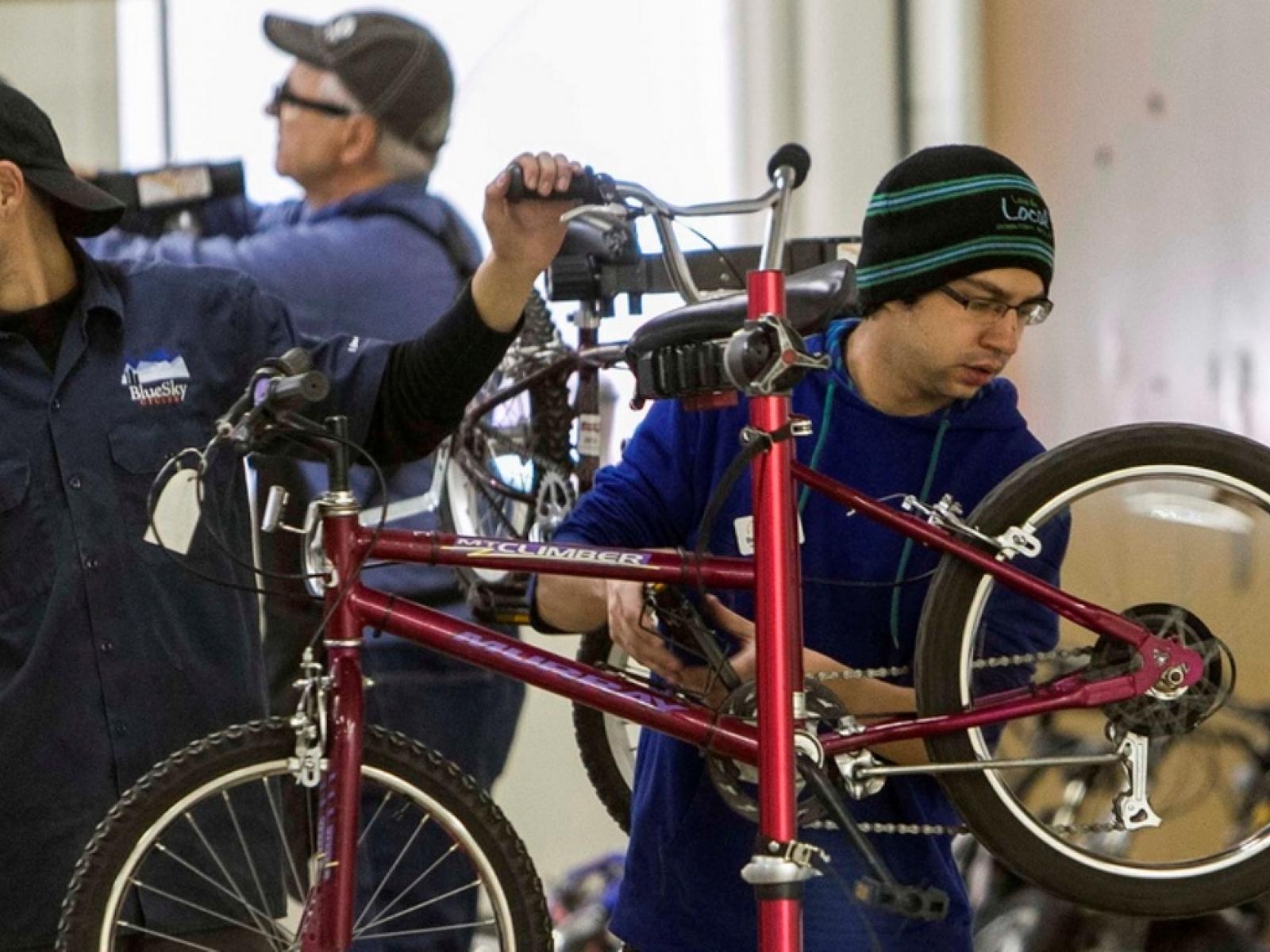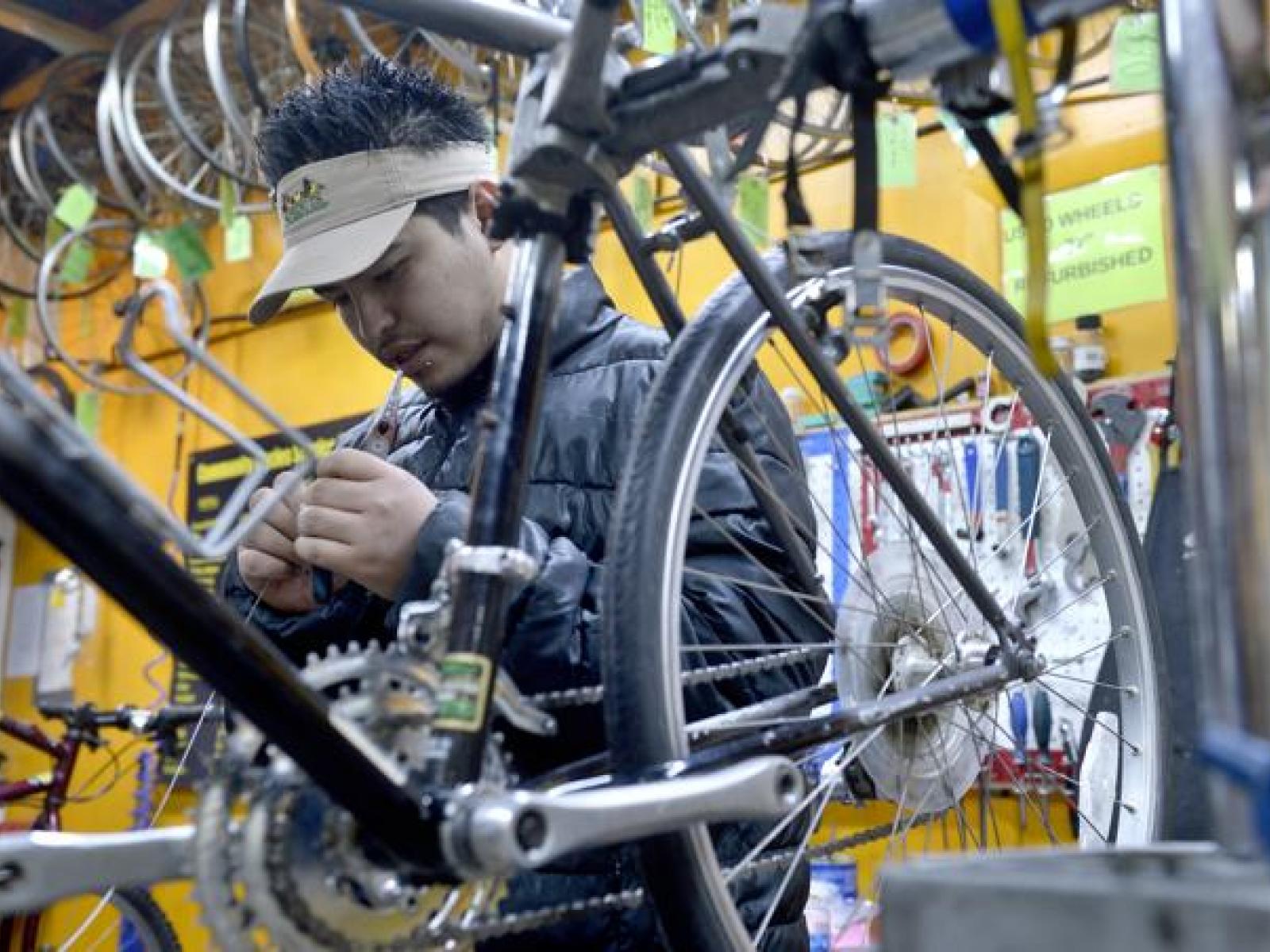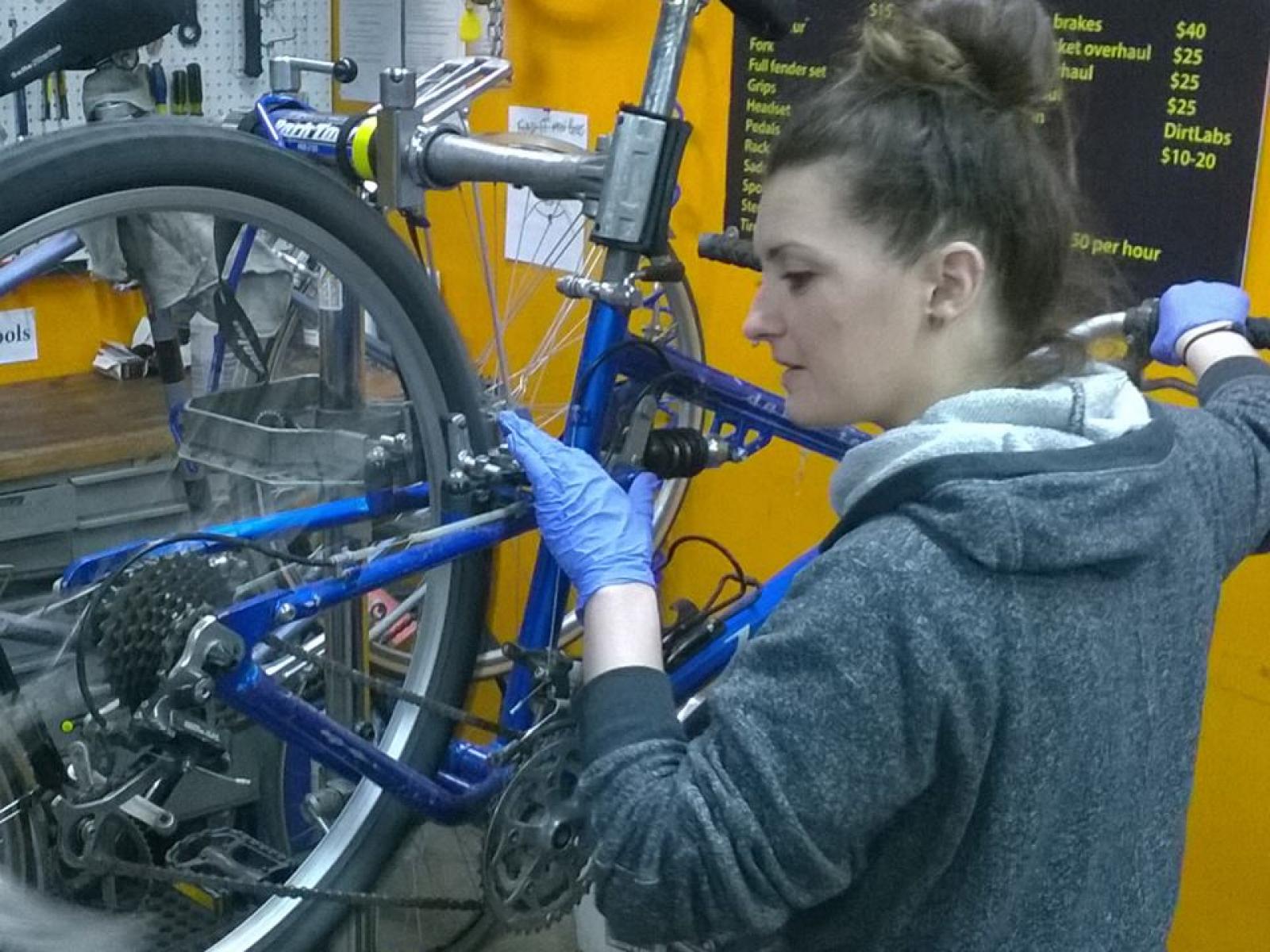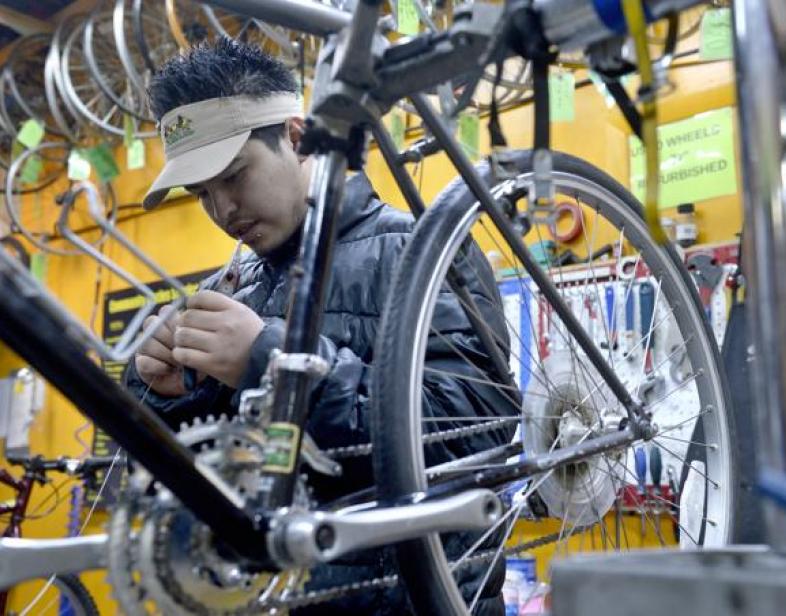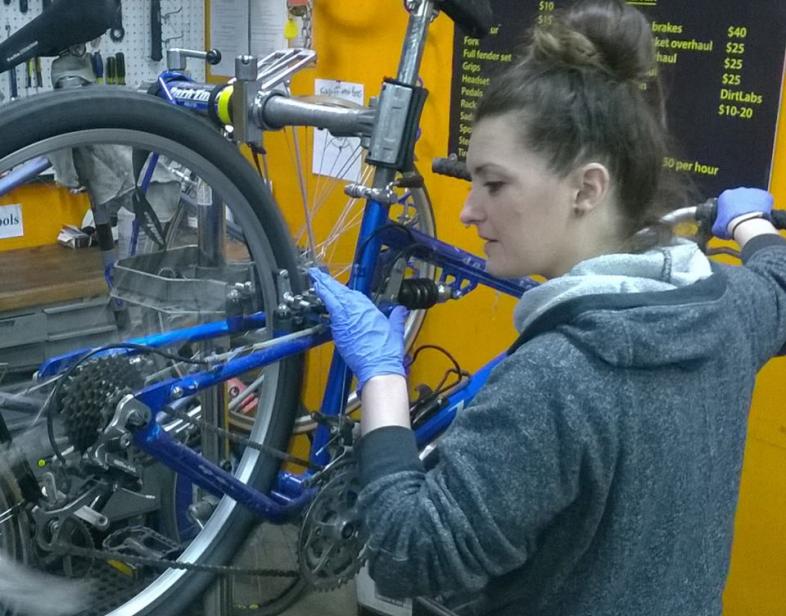An Overview Of Our Solution
Community Cycles is a nonprofit bike shop in Boulder, Colorado, that promotes, empowers, and advocates for bicycling as sustainable transportation.
We believe the bicycle, a benevolent machine, can help save our world.
Since 2006, we’ve been getting people out of their cars and onto their bikes, helping lower their carbon footprints. Boulder’s cyclists save 20,000 tons of carbon emissions every year (2 million gallons of gas), with more carbon and gas savings still to be achieved.
For over 100 years, the fossil fuel and automobile industries have shaped our world. We need a transportation transformation. Our strategies and programs for behavioral change create social incentives, choice architecture, and emotional appeals.
We propose to use our model as a prototype to launch, promote, and strengthen community bicycle hubs nationally and worldwide.
- Population Impacted: 300,000
- Continent: North America
Last name
Organization type
Context Analysis
In 2016, carbon emissions from transportation, over 1.9 billion tons/year, became the largest sector of the US carbon footprint, according to the EPA.
Travel data shows the results of engineering our cities with a default preference for cars: 50% of car trips are 5 miles or less; 25% are less than 2 miles. Making these short trips by bicycle is part of our needed transportation transformation.
Boulder's transportation-based carbon emissions exceed 300,000 tons/year, yet only 10% of our population regularly commutes by bicycle. Our city’s Climate Commitment shows that if 30% of residents commute by bicycle, we can meet our goals for cutting transportation carbon emissions. Each 1% increase of bike commuters saves about 900 tons of CO2 emissions and 90,000 gallons of gas.
On our Bike to Work Day, after weeks of building excitement, challenge, and incentives, 15% of Boulder’s residents ride to work. We know that strategically building a culture of cycling works.
Describe the technical solution you wanted the target audience to adopt
Our solution is a community bicycle center, created and maintained by community members. This hub of transportation transformation helps change transportation choices from fossil-fuel, high-carbon options into low-to-zero carbon solutions by:
• Recycling bicycles and providing people with affordable bikes;
• Encouraging, facilitating, and empowering people who ride bicycles for commuting to work, to school, for errands, and for recreation;
• Advocating for strategic infrastructure improvements so that commuters can get to work by bike or combine bicycles with public transit (bus) for regional travel, keeping a small carbon footprint while offering a “first mile, last mile” solution.
Our solution incorporates a quantifiable goal of carbon emissions saved and a process goal of organizational excellence.
We are bicycle commuters who continuously increase our ability to help more people choose the bicycle and our dedication to removing obstacles to behavioral changes.
Type of intervention
Describe your behavioral intervention
We strive to change people’s behavior so that they regularly choose cycling and sustainable transportation. This is “easier said than done.” The automobile industry is heavily advertised and subsidized, and we are confronting habitual consumer behaviors that have developed over several generations, for more than a century.
Research in Portland, Oregon, identified four groups of cyclists: Strong and Fearless (1% of the city’s population); Enthused and Confident (7%); Interested but Concerned (60%); and No Way, No How (28%).
Increasing the percentage of "Interested but Concerned" people who choose to ride their bicycles instead of using cars will dramatically reduce our carbon footprint. We ensure consumer adoption of this choice by making it easy and normal for people to ride bicycles, and through ongoing empowerment, support, and incentives.
We can positively influence consumer adoption through these strategies: awareness of the problem; articulating a compelling alternative; providing assistance with changing behaviors while understanding and overcoming obstacles; creating resistance to the old way of doing things; and changing cultural norms.
Our successful approach relies on an array of strategies for behavioral change, effectively using emotional appeals, choice architecture, and social incentives.
As needed, please explain the type of intervention in more detail
Why reinvent the wheel, indeed? We can repair it, teach people how to work on wheels, and put that wheel back to work, transforming our society and riding our way toward a low-carbon future.
From collecting and refurbishing bicycles for reuse, to our do-it-yourself (with our help) bicycle repair shop, to programs (Earn-A-Bike,) and events (Bike to Work Day, Walk and Bike Month, Kids Holiday Bike GIveaway), we get people on bikes and keep them there.
Our Advocacy Committee, comprised of energetic, knowledgeable individuals, works effectively day in and day out to convince our local governmental agencies to build ped/bike/transit-friendly infrastructure.
Describe your implementation
We agree with Marshall Rosenberg, the founder of Non-Violent Communication, that our emotions are connected with our met or unmet needs. People need enjoyment and community, so our emotional appeals emphasize fun and connection with others-- bicycling is gratifying, joyful, and brings well-being!
We also appeal to peoples’ need for ethics and caretaking, emphasizing that biking means cleaner air and fewer carbon emissions--this helps people to feel moral, generous, and aware.
We appeal to peoples’ emotional need for recognition, sponsoring light-hearted competitions that connect with self-sufficiency, competence, and pride.
Donors tell us they choose to invest in our work because "it's just positive." We spread bike love.
Social incentives build on our circle of relationships, through connections with people in their organizations. Change is more likely when we make personal commitments with others, see others adopting a new behavior, and get help when we need it.
Active on social media, we build strong outreach systems: our Walk and Bike Month list has 24,000 members from our city of 100,000, and our newsletters and advocacy alerts reach over 10,000. Our workshops create empowered cyclists who shape cultural norms.
To make choosing bikes over cars as easy as coasting down a hill, we shape behavior through choice architecture. Our Earn-a-Bike and Kid’s Holiday Bicycle Giveaway help get bicycles to those who need them, as do our efforts to get bikes to low-income people and those leaving the criminal justice system.
Our Learning Lab teaches bike repair skills, so that people can keep their bikes road-ready. We give away bike lights and distribute free bike-route maps.
We work with governments to create and improve bike-friendly roads. Our "Become a Bicycle Commuter" class reviews all the skills, choices, and dependencies involved so that more people can easily and joyfully choose to ride their bikes.
External connections
With our local community organizations, we use multiple tactics and strategies to help people become bicycle commuters.
To build a culture of cycling, we implement these programs in partnership and collaboration with local groups: Love to Ride challenge, Boulder County Clean Air Challenge, Walk and Bike Month, Pedal Smart, Bus Then Bike, Earn-A-Bike, County Jail Re-Entry, Transitions Earn A Bike for disabled youth, Kids Holiday Bike Giveaway, Employer Bike Fleet Program, Boulder Junction Bike Fleet, and more.
One partner, GO Boulder, is the multimodal transportation team within the city of Boulder transportation department. In collaboration with GO Boulder, we have been implementing Walk and Bike Month and Bike to Work Day for the past decade. Other community partners include our local university, elementary schools, neighborhood organizations, and Boulder Housing Partners, our low-income housing organization. We support a local nonprofit, Boulder Food Rescue, with bicycles, equipment, and trained mechanics.
As one example, the 2018 Winter Bike Week in Boulder was launched by a bike ride that included city council members, city staff, Boulder county commissioners, and other local leaders including the CEO of the Boulder Chamber and the Director of Downtown Boulder Inc., a business organization. Community Cycles members and neighborhood leaders led the leg of the ride through their streets and paths, highlighting desired destinations in their locales.
Who adopted the desired behaviors and to what degree?
We have built a community of empowered cyclists: our members, volunteers, and program participants use our shop 12,000 hours/year. We have restored more than 25,000 bikes, keeping them out of landfills. We've taught over 10,000 people in our workshops on commuting, bike maintenance, and safe cycling.
Community Cycles’ 2,500 members commute to work, to school, and for errands, biking 20 - 50 miles per week.
More than 2,000 low-income people have received bikes through our Earn A Bike (EAB) program, meeting essential transportation needs affordably and equitably. EAB graduates report riding 20-25 miles/week, with a positive impact on physical and mental health and economic well-being.
Participants in Walk and Bike Month and Bike to Work Day (BTWD) ride over 600,000 miles. Surveys show that BTWD participants continue this behavior change. Local transportation planners found biking is the fastest growing mode of transportation in the region – we are inspired by these results!
How did you impact natural resource use and greenhouse gas emissions?
Community Cycles’ behavior change work in our region has led to significant reductions in greenhouse gas emissions. We avoid 20,000 tons of carbon dioxide each year, or about 2 million gallons of gas. Our calculations are informed by the US DOT, DOE, and EPA:
• The average car mile produces 1.0 pound of CO2
• The average bus mile produces 0.1 pounds of CO2
• A bicycle mile produces zero pounds of CO2!
Surveys of our members, program participants, and customers quantify how many car trips we replace with bicycle trips.
We have kept over 750,000 pounds of bicycles and bike parts out of the landfill, including tires and tubes. In 2017, we saved 3,000 individual bicycles from the landfill.
Our sales of used bikes helped avoid at least another 6,625 tons of CO2, based on a published MIT estimate of the carbon emissions in manufacturing a typical bike.
We donate our scrap metal and used tubes and tires to local businesses who recycle or use them in upcycled products.
What were some of the resulting co-benefits?
Direct economic activity related to Boulder’s bicycle industry exceeded $52 million in 2010.
Denver’s infamous “brown cloud” is mostly caused by vehicles. Bike commuting improves air quality and lowers pollutants that affect public and environmental health.
Bike commuting saves money. The annual average operating cost of a bicycle is $308 while that of a car is $8220 (US Dept. of Transportation). Traffic congestion causes 4.8 billion hours of delay and wastes 3.9 billion gallons of fuel, costing more than $115 billion per year (Texas Transportation Institute). Car crashes cause 40,000 deaths per year in the U.S. and many costly injuries. Biking is a scalable solution!
Another important side effect is better health and well-being. One European study found that active commuters reduce their risk of heart disease by more than 10% and have lower risks for certain types of cancer. Cycling has been shown to increase social interactions and community connections as well.
Sustainability
Our organization sustainably meets our fiscal goals and fulfills our mission with multiple streams of economic support: donations, grants, sales, fees, and contracts.
Community donations, grants, and workshops account for roughly 40% of our budget. The remaining 60% comes from fee for service programs, contracts to create and maintain bike fleets, and sales of used bicycles, used parts, and new parts, and equipment for bicycle commuters.
A diversified source of revenue grows our strength and culture, and provides a sound economic base for our organization, creating green jobs, and growing a culture of cycling.
Return on investment
We began as a volunteer team working in donated sheds and garages.
For an initial investment of $1,000, we began collecting, recycling, and donating used bikes.
Our budget has grown to over $800,000, allowing us to implement programs to get people on bikes, keep people riding, and increase the number of cyclists in our city.
10% of Boulder commutes by bicycles, avoiding over 20,000 tons of carbon dioxide every year.
We've kept over 375 tons of bicycles and bike parts out of the landfill, and gotten used bikes to those who need and use them.
Our sales of 15,000 used bikes support our programs, avoiding the 1-ton carbon footprint per new bicycle, eliminating another 15,000 tons of carbon dioxide.
How could we successfully replicate this solution elsewhere?
Twenty community bike shops exist in the US, over 100 shops worldwide. These can be scaled up, and many others can be launched.
We’ll use funds to develop and hone our integrated approach to cutting carbon emissions by shaping transportation behavior. This may include focus groups, interviews, and surveys to identify obstacles and enhance emotional appeals, social incentives, and choice architecture.
A multilingual guidebook and/or website will detail our organizational model and our behavioral modification approaches, strategies, and tools.
Stakeholders include local, regional, and state governments, universities and schools, and employers, along with people who ride bicycles, who want to ride more, who want to cut greenhouse gases and generate positive change.
We'll motivate every community bike shop in the US and the world to generate a worldwide transportation transformation.
